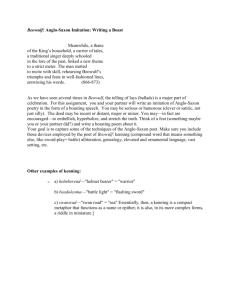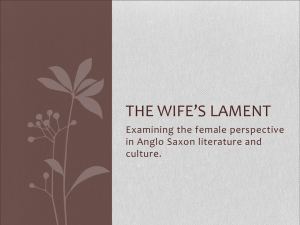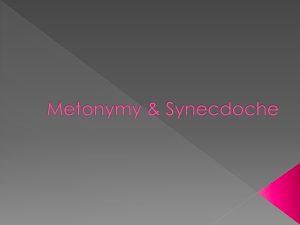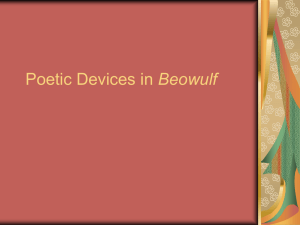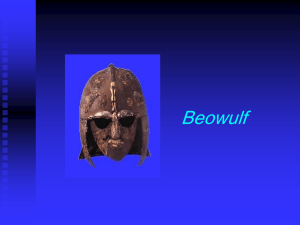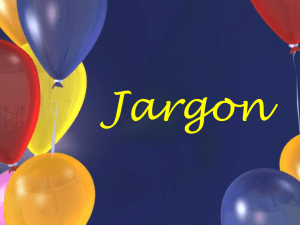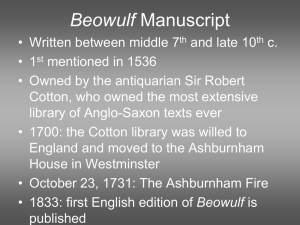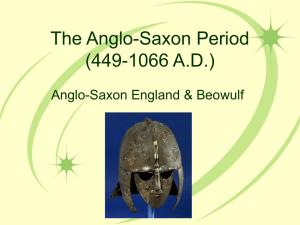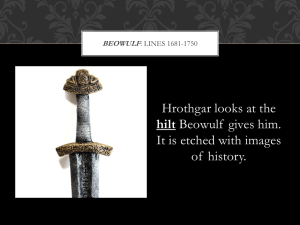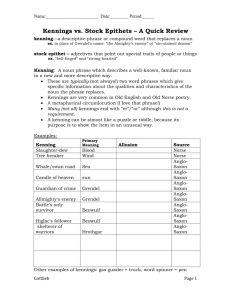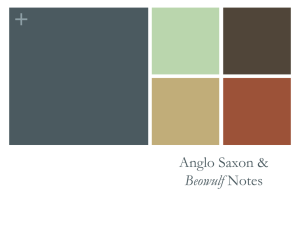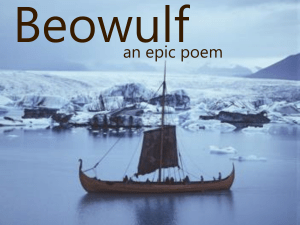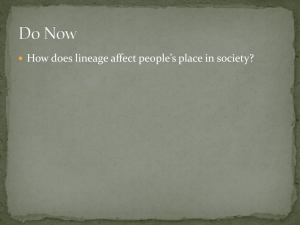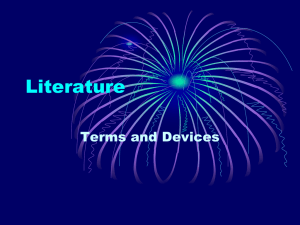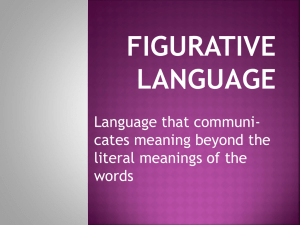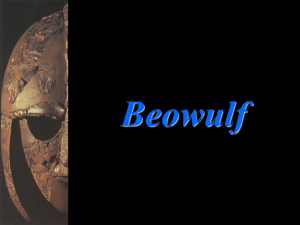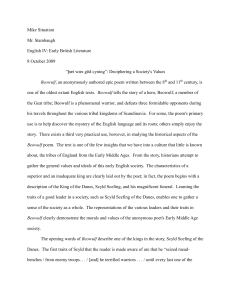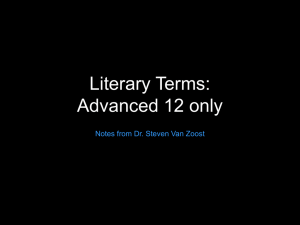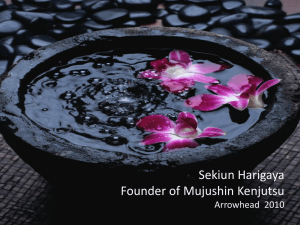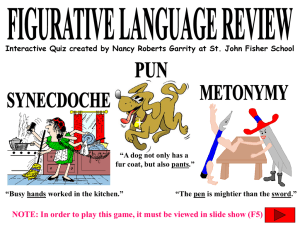File - JM`s AP Literature & Composition Classes
advertisement
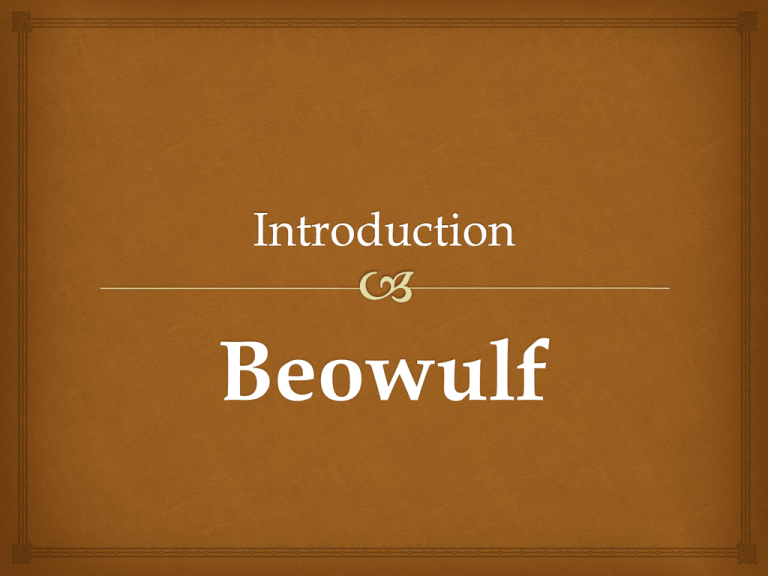
Beowulf History Author - Unknown – the poem has been translated several times (the version we are working with is translated by Seamus Heaney) Genre - Alliterative verse; elegy; resembles heroic epic, though smaller in scope than most classical epics Time and place written - Estimates of the date of composition range between 700 and 1000 a.d.; written in England The only manuscript in which Beowulf is preserved is thought to have been written around 1000 a.d. Narrator · A Christian narrator telling a story of pagan times Tense · Past, but with digressions into the distant past and predictions of the future Setting (time) · The main action of the story is set around 500 a.d.; the narrative also recounts historical events that happened much earlier. Setting (place) · Denmark and Geatland (a region in what is now southern Sweden) Seamus Heaney Irish Poet One of the most prominent poets of the 20th century Won the Nobel Prize in literature in 1995 "Heaney's own poetic vernacular—muscular language so rich with the tones and smell of earth that you almost expect to find a few crumbs of dirt clinging to his lines—is the perfect match for the Beowulf poet's Anglo-Saxon…As retooled by Heaney, Beowulf should easily be good for another millennium.“ -- Newsweek Review Old English Poetry Exploration Note-taking Take out your note –taking packets Skim through your notes and answer the following questions: What makes up the majority of your notes? Plot or analysis? Did you use specific quotes/citations in your notes? Do you ask questions? If yes, do you answer them? Share your notes with your partner. Are there similarities/differences? Original 5 10 Old English Text Hwæt! We Gardena in geardagum, þeodcyninga, þrym gefrunon, hu ða æþelingas ellen fremedon. Oft Scyld Scefing sceaþena þreatum, monegum mægþum, meodosetla ofteah, egsode eorlas. Syððan ærest wearð feasceaft funden, he þæs frofre gebad, weox under wolcnum, weorðmyndum þah, oðþæt him æghwylc þara ymbsittendra ofer hronrade hyran scolde, gomban gyldan. þæt wæs god cyning! Kennings Poetic word puzzles, formed from compound nouns in a formula phrase. Often metaphors. Beo (bee) Wulf (wolf/hunter), so bee hunter is a kenning for bear. Battle-flasher = sword ring-giver = Hrothgar Hand-spurs = claws oar-steed=ship Slaughter-dew = blood bright-ring-hall=Heorot Whale-road = sea battle-adder=arrow Kenning Creation Make your own kenning. Perhaps for words such as: Teacher Pencil Apple Doctor Dog Book Poetic metaphors encouraged Litote Ironic understatement (affirmative is expressed by stating its opposite) After Grendel’s first rampage against Heorot (ln 138): “It was easy then to meet with a man shifting himself to a safer distance to bed.” Litotes. . . When Beowulf discovers a sword in Grendel’s mother’s cave: “That edge was not useless to the warrior now” (ln 160 Chickering). Describing the battle with sea-monsters: “Small pleasure they had in such a sword-feast” (ln 562 Chickering). Litotes. . . She’s no idiot. He’s no Einstein. He is not unlike his dad. It isn't very serious. I have this tiny little tumor on the brain. We are not amused. Your turn – create a litote, offering context as needed. p.s. When it’s consistently downplaying an event, it’s called meiosis (figure of speech, not biology term): setting fire to the barn was merely a “prank.” Metonymy A figure of speech in which one noun or phrase is used to replace another. For example, instead of saying, “Aristotle,” a text may refer to “The Philosopher.” “Iron” instead of “sword.” Find 5. Create a sentence illustrating use of metonymy. Synecdoche A figure of speech in which one noun or phrase is used to replace a larger whole. For example, referring to an entire ship as a “keel,” or “edge” for “sword.” Find 2. Create a sentence illustrating use of synecdoche. Identify techniques in excerpt Then the valiat Geat asked Ecglaf’s son to carry Hrunting, keep the great sword, cherished iron; thanked him for the loan, said he thought it a good war-friend, strong in battle, and did not blame its edges. Beowulf was noble, generous in spirit. And then the travelers were ready to leave, equipped in their harness; their Dane-honored prince marched to the high seat where the other leader was sitting in state; the hero saluted him. Chickering, lines 1807-1818 Review Caesura Kenning Litote Metonymy Synecdoche Translator choices Importance of Word Choice Read the three excerpts on the handout Annotate each excerpt Look for literary techniques Compare/contrast tone Take note of relatively major differences and analyze the impact those differences have on the reader Share with a partner Discuss as a class
